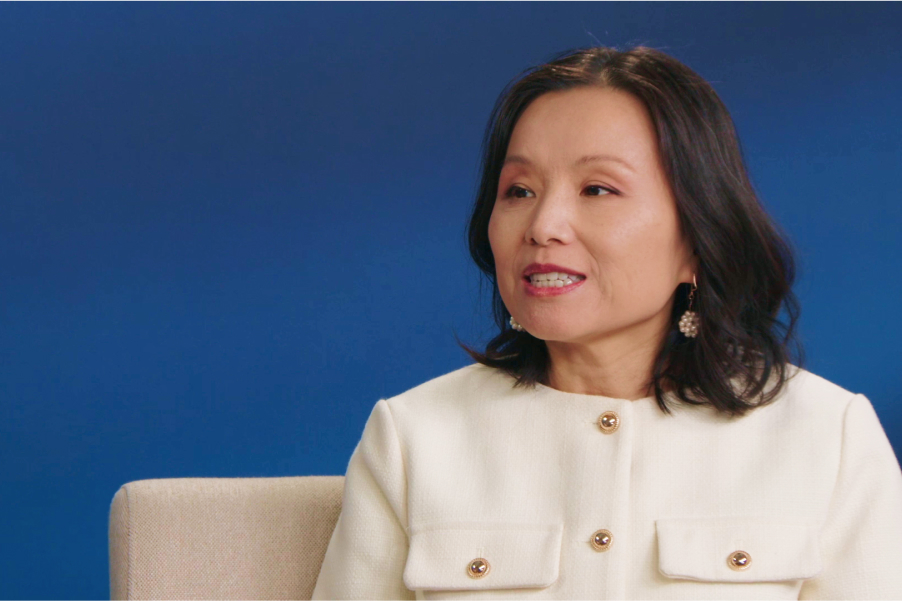July 28th, 2025
3 min read
Former VMWare Executive Anna Lee is an AI practitioner with nearly a decade of experience in generative AI and early AI agents, along with 15+ years in product management, product marketing, strategy, planning, operations, business development, pricing, monetization and finance. In addition to VMware, she has worked at SAP, Visa, Schwab and Disney. She has a passion for helping corporations and entrepreneurs scale their businesses.
Lee shares her insights into how AI-driven transformation is revolutionizing enterprise strategy – and reshaping the ways in which businesses operate, innovate, and grow.

Bridges and Barriers
Digital transformation is a seismic shift that’s fundamentally reshaping enterprise strategies. At the heart of this change is the growing influence of AI – and specifically Agentic AI.
“Enterprises are no longer just adopting third-party SaaS solutions,” says Lee. “Instead, they’re shifting toward bespoke AI applications that are tailored to their specific needs and can adapt in real time.” This represents a profound change in how businesses operate, with AI creating entirely new, self-evolving business processes even as they also enhance existing systems. As companies become more independent from external vendors, their operations are becoming increasingly customized and efficient, powered by intelligent systems that learn and adapt on their own.
Gone are the days of one-size-fits-all software solutions. Traditional enterprise software was built to be broadly applicable across industries, often requiring cumbersome customization and expensive integrations. AI-driven platforms, on the other hand, are tailored to meet the unique needs of each company and designed to evolve alongside them.

Lee says big names like JP Morgan, Goldman Sachs and BBVA are at the forefront of this shift, actively re-architecting their systems to reduce reliance on external vendors. “The ability to eliminate vendor lock-in is a huge advantage for large enterprises,” Lee says. “With AI, companies have the flexibility to scale their operations without being tied to the constraints of third-party software providers.” This newfound freedom is enabling companies to innovate faster and more efficiently than ever before.
As AI continues to gain ground in enterprise software, the competition in the AI space is heating up, with OpenAI and Anthropic emerging as the two key players to watch. Lee believes OpenAI, with its deep integration into Microsoft’s ecosystem, has a significant head start. The company’s large-scale deployments across various industries give it a clear edge in driving enterprise AI adoption.
However, Lee adds, Anthropic is quickly gaining traction as a formidable challenger. “While OpenAI has established dominance, Anthropic’s focus on AI safety and alignment positions it as a strong competitor,” she says. “That said, scalability and enterprise-grade reliability are still critical concerns for many companies.” As enterprises look to integrate AI on a larger scale, ensuring that these systems can handle the complexity and scale of large organizations will remain a crucial challenge.
For Chief Financial Officers (CFOs), AI is becoming a strategic tool that can deliver tangible business benefits. When evaluating AI investments, Lee says CFOs focus on three main factors: revenue lift, cost reduction, and regulatory compliance.
“Cost reduction is the initial focus for most CFOs,” Lee notes. “AI-driven automation allows them to realign their workforce, reducing the need for manual, repetitive tasks. This frees up resources for more strategic initiatives that drive growth.” As AI continues to evolve, it’s clear that CFOs will not just use these tools to cut costs, but also to accelerate innovation and ensure compliance with ever-tightening regulations.
“AI is fundamentally reshaping enterprise software – moving from rigid, one-size-fits-all solutions to intelligent, adaptive platforms that evolve in real time. The winners in this shift will be those who harness AI to drive efficiency, reduce costs and create competitive advantage at scale.”
AI in Society
“AI will streamline operations in ways we’ve never seen before,” says Lee. “In large enterprises, this could mean a significant shift in hiring strategies, with companies reallocating employees from low-value tasks to high-impact roles.”
This shift can drastically reduce the need for large development teams as AI takes on many of the tasks traditionally handled by human workers. The question now is how the workforce will adapt. For Gen Z and Alpha, an AI-driven workforce will be the new normal, much like past generations had to adjust to the wave of outsourcing.
Lee believes the key to success will be an ability to embrace AI as a partner, not a replacement. As the workplace continues to evolve, those who can leverage AI to augment their abilities will thrive in this new landscape.




